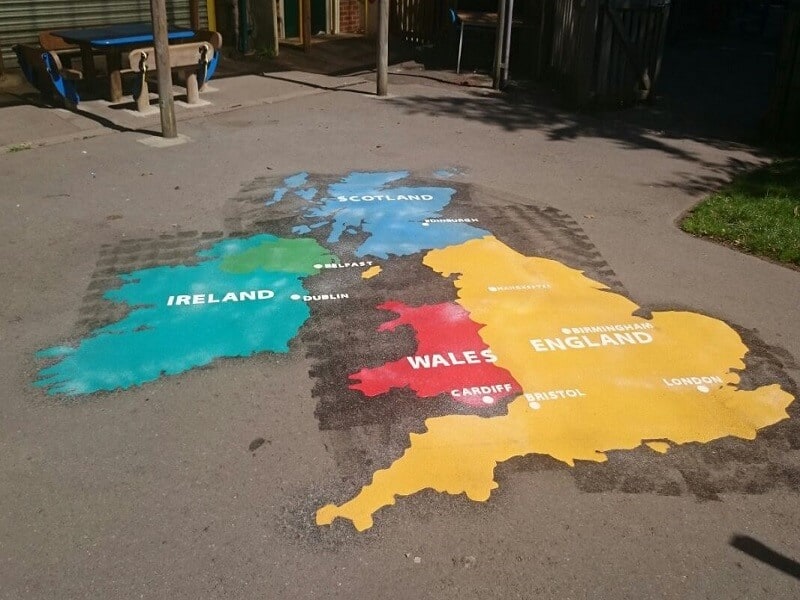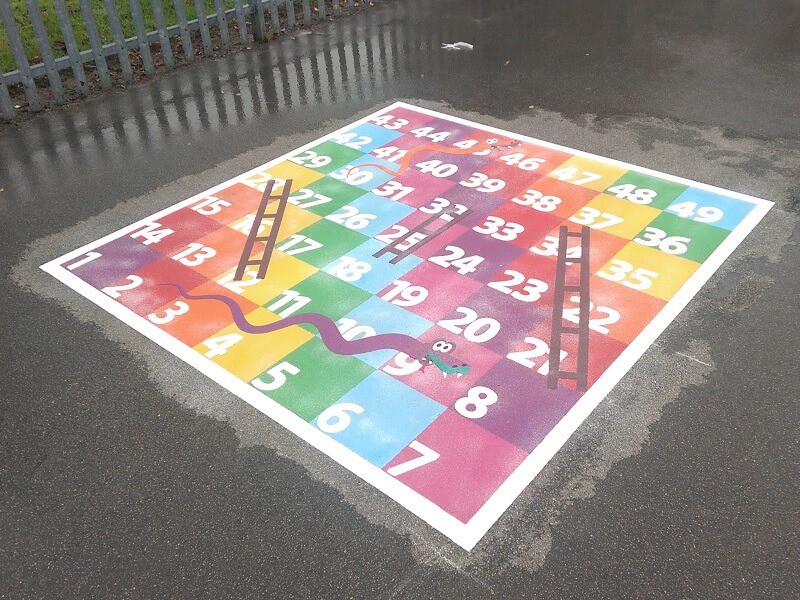20+ Years Experience
Specialist Playground Markings

Playgrounds are more than just spaces for fun and recreation. They play a crucial role in the cognitive development of children.
Playgrounds provide an environment where children can engage in various activities that stimulate their brains and foster cognitive skills.
Parents, educators, and policy-makers must understand the importance of playgrounds and their impact on brain development.
The significance of playgrounds for children goes beyond physical exercise. Playgrounds provide a space where children can explore, experiment, and learn. Here are some reasons why playgrounds are important for children:
When children engage in play, their brains undergo various processes that support cognitive development.
Play stimulates the brain by creating new connections between brain cells, strengthening existing neural pathways, and enhancing cognitive skills. During play, the brain releases chemicals that promote learning, memory formation, and problem-solving abilities.
Play contributes to cognitive development in multiple ways. It fosters problem-solving and critical thinking skills as children encounter challenges and find innovative solutions.
Play also sparks creativity and imagination, allowing children to explore new ideas and possibilities. play enhances memory and attention span through repeated exposure, practice, and reinforcement.
Language and communication skills are also developed as children engage in pretend-play scenarios and interact with others.
Playgrounds play a vital role in enhancing cognitive skills. They provide a stimulating environment that encourages children to engage in different types of play, promoting cognitive development across various domains.
Playgrounds facilitate cognitive development by providing opportunities for sensory exploration, open-ended play, and engagement with stimulating equipment and materials.
When it comes to outdoor play, the benefits for cognitive development are even more pronounced.
Outdoor play offers exposure to natural stimuli, such as fresh air, sunlight, and natural textures, which have a positive impact on cognitive functioning.
Outdoor playgrounds often incorporate elements like nature trails, climbing frames, and water play areas that enhance cognitive skills through sensory experiences and exploration.
Playing in playgrounds offers numerous cognitive benefits that contribute to brain development. These benefits include:
During play, the brain undergoes various processes that contribute to cognitive development. The brain releases neurotransmitters like dopamine and endorphins, which enhance mood and motivation.
It also activates multiple regions, such as the prefrontal cortex, responsible for problem-solving and decision-making.
Play stimulates synaptic connections and strengthens neural pathways, improving memory and attention. It encourages creativity and imagination by stimulating the brain’s ability to think outside the box.
Play also enhances language and communication skills through social interaction. Play provides a rich environment for brain development, fostering cognitive skills in children.
Understanding what happens in the brain during play helps us recognise the importance of providing ample opportunities for play in children’s lives.
Incorporating a variety of play experiences, both indoors and outdoors, can further enhance cognitive development.
Encouraging imaginative play, providing open-ended materials, and promoting social interaction can all contribute to maximising the cognitive benefits of play.
Play contributes to cognitive development in several ways. It stimulates neural connections and promotes the growth of new brain cells, particularly in areas related to problem-solving and critical thinking. It also engages children’s creativity and imagination, allowing them to explore new ideas and solutions.
Additionally, play enhances memory and attention skills as children participate in activities that require them to remember rules or pay attention to details.
Moreover, play promotes language and communication skills as children interact with others and engage in pretend play scenarios.
Overall, play provides a rich and stimulating environment for children to cultivate their cognitive abilities.
To foster cognitive development through play, it is important to encourage open-ended play opportunities, provide a variety of materials and toys, and allow children to engage in both structured and unstructured play.
Curiosity and imagination soar on playgrounds, nurturing essential cognitive skills in young minds.
Let’s explore the intriguing realm of cognitive development through play by uncovering the various skill sets that are nurtured in this dynamic environment.
We will delve into the wonders of problem-solving, critical thinking, creativity, memory, and attention that unfold amidst the laughter and joy of play.
Problem-solving and critical thinking skills are essential for a child’s cognitive development. Playgrounds offer an ideal environment for children to develop these skills.
Through play, children are presented with challenges that require problem-solving and critical thinking. They learn to analyse situations, develop strategies, and make decisions.
Playgrounds with a variety of play structures, puzzles, and interactive games encourage children to think critically and find solutions. Examples include climbing walls, mazes, and logic-based games.
By participating in these activities, children nurture their problem-solving and critical thinking abilities, establishing a solid foundation for their cognitive development.
Creativity and imagination are important cognitive skills that children develop through play in playgrounds. Playground facilities promote creativity and imagination in various ways:
By providing an environment that encourages creativity and imagination, playgrounds play a vital role in fostering cognitive development in children.
Enhancing memory and attention is one of the cognitive benefits of playgrounds.
Playgrounds provide opportunities for children to engage in activities that require them to remember and focus on tasks. These activities can include memory games, obstacle courses, and scavenger hunts.
The active and stimulating environment of playgrounds helps children improve their cognitive abilities by challenging their memory skills and increasing their attention span.
Participating in these activities allows children to strengthen their memory and attention skills while having fun and being physically active. Therefore, playgrounds play a crucial role in promoting cognitive development in children.
When children engage in play at playgrounds, it offers them opportunities to develop and enhance their language and communication skills.
Through interactive play, children learn to express themselves, communicate with others, and develop vocabulary.
Playgrounds provide a social environment where children can engage in pretend play, engaging in conversations and practicing turn-taking. During group play, children collaborate and negotiate, further improving their communication abilities.
Playgrounds also offer diverse opportunities for language development, such as reading signs and labels, engaging in storytelling, and engaging in imaginative play where they create and communicate their own narratives.
Selecting a good playground is crucial for enhancing cognitive skills in children. Here are some factors to consider when choosing a playground:
Playgrounds facilitate cognitive development in children through various ways:
By providing a rich environment for exploration, socialisation, and physical activity, playgrounds support children’s cognitive development and enhance their overall learning capabilities.
To support cognitive development, playgrounds should offer opportunities for a variety of play and engagement. Here are some types of playgrounds that are beneficial for cognitive skills:
Consider incorporating these elements into playground design to cultivate cognitive skills in children and create engaging and enriching play experiences.
Outdoor playgrounds are of great importance for cognitive development in children. Here are a few reasons why:
Outdoor play has numerous benefits for cognitive development in children. When children engage in outdoor play, they have opportunities to learn and improve cognitive skills in various ways. Here are some ways in which outdoor play benefits cognitive development:
Outdoor play equipment plays a crucial role in promoting cognitive skills in children. Here are some examples of equipment that can enhance cognitive development:
Playgrounds provide a diverse group of peers and multisensory play experiences that enhance cognitive skills such as information processing, analysing ideas, and developing opinions.
Children can compare and contrast ideas, consider possibilities, and become effective thinkers.
Sensory play on playgrounds stimulates various senses, including sight, touch, taste, smell, sound, vestibular (movement and balance), and proprioceptive (body awareness).
These activities contribute to cognitive development by improving observation skills, sound processing, and balance and coordination, while also encouraging problem-solving and critical thinking.
Sensory play on playgrounds facilitates interaction with peers, allowing children to build new relationships and develop social learning skills.
It also supports emotional development by promoting self-esteem and mastery, as well as enhancing language development, fine motor skills, and the ability to express and imagine experiences.
During the early years, play on playgrounds helps build the brain more quickly by providing physical challenges and sensory-rich experiences.
It contributes to the development of cognitive, emotional, physical, and social skills, laying a strong foundation for future learning and positive outcomes in life.
Parents and adults can support cognitive development by providing age-appropriate materials and environments for sensory play on playgrounds.
They can encourage children to engage in diverse play activities that stimulate cognitive skills, such as gathering information, analysing ideas, and developing creative and unique solutions.
Play on playgrounds can target different stages of development, including early adolescence. It offers opportunities for children to develop cognitive skills, motor skills, social skills, and emotional learning.
Additionally, play can help children navigate through different cognitive milestones, such as riding a bike, by providing the necessary physical challenges and experiences.








We Aim To Reply To All Enquiries With-in 24-Hours